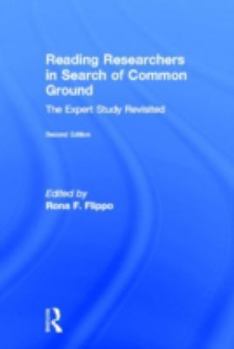Reading Researchers in Search of Common Ground: The Expert Study Revisited
Select Format
Select Condition 
Book Overview
In this new edition, Rona F. Flippo revisits her 2001 Expert Study, in which she set out to find common ground among experts in field of reading research, taking a fresh look at it and its implications in light of current thinking and research.
Format:Hardcover
Language:English
ISBN:0415801125
ISBN13:9780415801126
Release Date:July 2011
Publisher:Routledge
Length:392 Pages
Weight:1.60 lbs.
Dimensions:0.9" x 6.1" x 9.2"
Customer Reviews
1 rating
Why Do We Have 50,000,000 Functional Illiterates?
Published by Thriftbooks.com User , 16 years ago
During the 1920's a shadow fell over the land; its most memorable manifestation was a mindless babble somewhat like, "See Dick run. See Dick. See, see, see! Oh. Dick!" The shadow lengthened and darkened, creating tens of millions of illiterates, until the inestimable Rudolph Flesch analyzed the malaise (1955) and noted that the problem was simply explained. Teachers were using a voodoo called Look-Say. The alphabet of an alphabetic language was ignored; and children were made to memorize word-shapes. Imagine a car without wheels--you get the same level of impracticality. The shadow shuddered with indignation, and redoubled its propaganda. The visible manifestation was the creation (in 1955) of the International Reading Association or IRA, whose purpose was to denigrate Flesch and phonics, while making sure that no child escaped the shadow. Forty more years of darkness ensued. The land was overrun by functional illiterates, as many as 50,000,000 of them. But the IRA held firm--until, that is, reading scores fell so low in California that the haughty Californians were crushed by shame. Reforms erupted. Phonics made a come-back. The shadow limped off to devise a counter-attack. Which brings us to this curious book (published in 2001 by a division of the IRA), in which about 20 "reading experts" chatter earnestly about all the things they agree on. The main one is that the IRA has nothing to apologize for, because it was never wrong. (They don't actually say this; it's just assumed.) The next point of agreement is that drips and dabs of phonics are surely appropriate, but didn't we always say that?? The next point of agreement is that the experts want to go on doing what they were doing before, but now instead of calling it Whole Language, they'll call it Balanced Literacy. Of course, Flesch is still a dangerous man. As one expert notes: "Flesch's book had little, if any, substantive impact on the work of reading professionals...it was dismissed by the educational establishment as the emotional rants of a malcontent." At least we can understand this sentence. (Bitterness seems to sharpen the expert tongue.) Most of this collection, however, is nebulous and needy. These people have a real problem--and you can watch them struggle to solve it. How can they present a unified front to the public? What can they still get away with in the schools? The endless refrain in this book is: Hey, look at us, we're "literacy professionals," and no matter what you might hear in the right-wing media, we agree on a lot. So there! In fact, these experts are really all over the place. That's because there seems to be one good idea (synthetic phonics), which they disdain, and several dozen bad ideas, which they endorse to a greater or lesser degree. Trying to stay on good terms with all these bad ideas, and with all the colleagues pushing all these ideas, requires major political skills, plus the ability to write prose with no sharp edges, for example: "A numb






